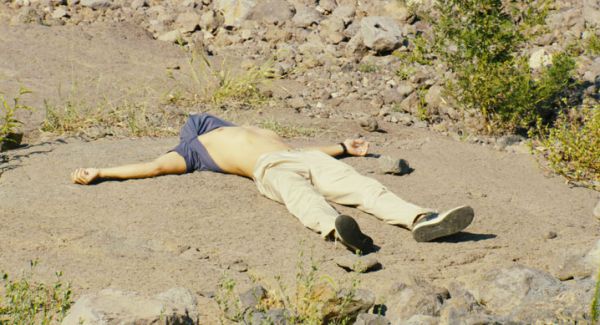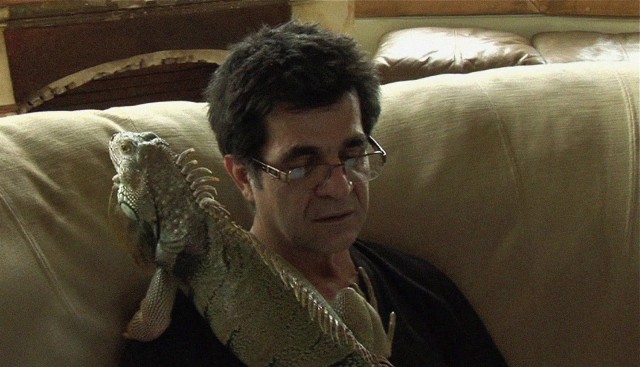Cherry Lane Theatre
38 Commerce St.
Through April 1, $61
212-989-2020
www.cherrylanetheatre.org
Something strange happened after we returned to our seats following a brief stroll outside in the beautiful fresh air of a lovely end-of-winter evening during intermission of Teresa’s Ecstasy, running at the Cherry Lane through April 1. It was like we had walked back into a different play. What had been a warm, intimate, and engaging story suddenly turned acidic, mean-spirited, and convoluted. Thank goodness the dreadful second act is much shorter than the tender first. Playwright Begonya Plaza stars as Carlotta, a writer who has returned to Barcelona to get her husband, Andrés (Shawn Elliott), to finally sign their divorce papers and to research a magazine story she is doing on St. Teresa of Avila, a sixteenth-century Carmelite nun of Jewish ancestry who, as Carlotta notes, “overcame death-threatening illnesses, defamations, ethnic and religious genocide by the Spanish Inquisition, reformed her own church, founded over a dozen monasteries, and all the while writing works, masterworks, of literature.” But Andrés, a painter, has no time for organized religion and mysticism. “She’s part of an institution that excludes, kills, exploits, and brainwashes people into complacency,” the painter says. “God is an invention to control the masses for power and wealth.” While that is not necessarily an original argument, the debate works well between the passionate Carlotta and the gentle, easygoing Andrés, even when they are joined by Carlotta’s editor, Becky (Linda Larkin), a sharp-dressed elitist blonde who is immediately at odds with Andrés. But when Becky and Carlotta return from Avila in the second act, they are transformed in such a way that is utterly unbelievable, delivering clichéd diatribes on sex and religion as Andrés turns nasty and rotten, completely undermining everything that was so well established in the first act. Elliott, who had been in the midst of an unforgettable performance, his every movement a work of art, from his arms, hands, and head to his soft eyes that gaze into the audience, stumbled badly over one line, as if he couldn’t get himself to say it out loud in public. Meanwhile, Plaza forces in references to Cat Stevens and Federico García Lorca that feel out-of-place and downright unnecessary. Directed by Will Pomerantz, Teresa’s Ecstasy features tantalizing foreplay that fails to reach a satisfying conclusion.




 South Korean auteur Hong Sang-soo’s most recent film about a South Korean auteur, Like You Know It All, is another intriguing examination of art and sex in contemporary society, following Night and Day (2008), Woman on the Beach (2006), Tale of Cinema (2005), and Woman Is the Future of Man (2004). Hong, who has served as a juror at several film festivals and whose work has screened at fests all over the world, sets his latest self-reflexive story at the real Jecheon International Music and Film Festival, where director Ku will be part of the jury. But it turns out that Ku is a self-absorbed, insensitive, and subtly obnoxious filmmaker who cares only about himself, walking away from fans and colleagues in the middle of a conversation or in the midst of signing an autograph, interested only in listening to people praise his own talent, which has been relegated to art-house films that few people see and even fewer understand. After leaving the festival to teach a class at a school on Jeju Island, he visits with a famous painter and former mentor who has unknowingly married Ku’s first love, setting the stage for the creepy Ku to perform yet more selfish acts. Kim Tae-woo is outstanding in the lead role, playing the self-obsessed director with an unerring casualness that makes him more absurdly ridiculous than conniving and mean-spirited. With a little bit of Federico Fellini’s 8 1/2 here and a touch of Woody Allen’s Stardust Memories there, Hong once again reveals the soft underbelly of ego within the film industry, but he also needs to edit himself more, as the bittersweet, slyly ironic Like You Know It All, made for a mere $100,000, is yet another of his films to clock in at more than two hours (though it feels longer). Like You Know It All is screening as Woman on the Beach is screening March 18 as part of the Museum of the Moving Image’s retrospective of Hong’s work, which also includes Night and Day, Woman on the Beach, Oki’s Movie, and The Day a Pig Fell into the Well.
South Korean auteur Hong Sang-soo’s most recent film about a South Korean auteur, Like You Know It All, is another intriguing examination of art and sex in contemporary society, following Night and Day (2008), Woman on the Beach (2006), Tale of Cinema (2005), and Woman Is the Future of Man (2004). Hong, who has served as a juror at several film festivals and whose work has screened at fests all over the world, sets his latest self-reflexive story at the real Jecheon International Music and Film Festival, where director Ku will be part of the jury. But it turns out that Ku is a self-absorbed, insensitive, and subtly obnoxious filmmaker who cares only about himself, walking away from fans and colleagues in the middle of a conversation or in the midst of signing an autograph, interested only in listening to people praise his own talent, which has been relegated to art-house films that few people see and even fewer understand. After leaving the festival to teach a class at a school on Jeju Island, he visits with a famous painter and former mentor who has unknowingly married Ku’s first love, setting the stage for the creepy Ku to perform yet more selfish acts. Kim Tae-woo is outstanding in the lead role, playing the self-obsessed director with an unerring casualness that makes him more absurdly ridiculous than conniving and mean-spirited. With a little bit of Federico Fellini’s 8 1/2 here and a touch of Woody Allen’s Stardust Memories there, Hong once again reveals the soft underbelly of ego within the film industry, but he also needs to edit himself more, as the bittersweet, slyly ironic Like You Know It All, made for a mere $100,000, is yet another of his films to clock in at more than two hours (though it feels longer). Like You Know It All is screening as Woman on the Beach is screening March 18 as part of the Museum of the Moving Image’s retrospective of Hong’s work, which also includes Night and Day, Woman on the Beach, Oki’s Movie, and The Day a Pig Fell into the Well.
 “You call this a film?” Jafar Panahi asks rhetorically about halfway through the revealing documentary This Is Not a Film. After several arrests beginning in July 2009 for supporting the opposition party, the highly influential and respected Iranian filmmaker (Crimson Gold, Offside) was convicted in December 2010 for “assembly and colluding with the intention to commit crimes against the country’s national security and propaganda against the Islamic Republic.” Although facing a six-year prison sentence and twenty-year ban on making or writing any kind of movie, Panahi is a born storyteller, so he can’t stop himself, no matter the risks. Under house arrest, Panahi has his friend, fellow director Mojtaba Mirtahmasb (Lady of the Roses), film him with a handheld DV camera over ten days as Panahi plans out his next movie, speaks with his lawyer, lets his pet iguana climb over him, and is asked to watch a neighbor’s dog, taking viewers “behind the scenes of Iranian filmmakers not making films.” Panahi even pulls out his iPhone to take additional video, photographing New Year’s fireworks that sound suspiciously like a military attack. Panahi is calm throughout, never panicking (although he clearly does not want to take care of the barking dog) and not complaining about his situation, which becomes especially poignant as he watches news reports on the earthquake and tsunami disaster in Japan. “But you can’t make a film now anyhow, can you?” Mirtahmasb — who will later be arrested and imprisoned as well — asks at one point. “So what I can’t make a film?” Panahi responds. “That means I ask you to take a film of me? Do you think it will turn into some major work of art?” This Is Not a Film, which was smuggled out of Iran in a USB drive hidden in a birthday cake so it could be shown at Cannes, is indeed a major work of art, an important document of government repression of free speech as well as a fascinating examination of one man’s intense dedication to his art and the creative process. (After playing for two weeks at Film Forum, This Is Not a Film has moved to Cinema Village, where it opens March 16.)
“You call this a film?” Jafar Panahi asks rhetorically about halfway through the revealing documentary This Is Not a Film. After several arrests beginning in July 2009 for supporting the opposition party, the highly influential and respected Iranian filmmaker (Crimson Gold, Offside) was convicted in December 2010 for “assembly and colluding with the intention to commit crimes against the country’s national security and propaganda against the Islamic Republic.” Although facing a six-year prison sentence and twenty-year ban on making or writing any kind of movie, Panahi is a born storyteller, so he can’t stop himself, no matter the risks. Under house arrest, Panahi has his friend, fellow director Mojtaba Mirtahmasb (Lady of the Roses), film him with a handheld DV camera over ten days as Panahi plans out his next movie, speaks with his lawyer, lets his pet iguana climb over him, and is asked to watch a neighbor’s dog, taking viewers “behind the scenes of Iranian filmmakers not making films.” Panahi even pulls out his iPhone to take additional video, photographing New Year’s fireworks that sound suspiciously like a military attack. Panahi is calm throughout, never panicking (although he clearly does not want to take care of the barking dog) and not complaining about his situation, which becomes especially poignant as he watches news reports on the earthquake and tsunami disaster in Japan. “But you can’t make a film now anyhow, can you?” Mirtahmasb — who will later be arrested and imprisoned as well — asks at one point. “So what I can’t make a film?” Panahi responds. “That means I ask you to take a film of me? Do you think it will turn into some major work of art?” This Is Not a Film, which was smuggled out of Iran in a USB drive hidden in a birthday cake so it could be shown at Cannes, is indeed a major work of art, an important document of government repression of free speech as well as a fascinating examination of one man’s intense dedication to his art and the creative process. (After playing for two weeks at Film Forum, This Is Not a Film has moved to Cinema Village, where it opens March 16.)
 Cannes favorites Jean-Pierre and Luc Dardenne have been making critically hailed naturalistic films for more than thirty years, including such Palme d’Or winners as Rosetta (1999) and L’Enfant (2005). The Belgian brothers’ latest, the exquisitely told The Kid with a Bike, shared the 2011 Grand Prix with Nuri Bilge Ceylan’s Once Upon a Time in Anatolia. In The Kid with a Bike, thirteen-year-old newcomer Thomas Doret makes a mesmerizing acting debut as Cyril, a young boy who refuses to accept that the father (Jérémie Renier) he worships has abandoned him. While running away from the children’s home he has been sent to, he winds up in the arms of hairdresser Samantha (Cécile de France), who feels an instant connection with Cyril and agrees to take him in on weekends. But Cyril only wants his father and is soon rebelling by hanging out with an older boy known as Dealer (Egon Di Mateo), the leader of a gang of local toughs who recruits Cyril to do a little job for him. Desperate for a father figure, Cyril agrees, with severe consequences. The Dardennes (La promesse, Lorna’s Silence) had the cast rehearse on-set and in costume for a month, which gives the film a deeply realistic feel. Shooting in the summer for the first time, the Dardennes concentrate on three primary locations: the city, where Cyril keeps searching for his father and gets his bike stolen; a forest that threatens physical danger; and a gas station where the plot subtly shifts. Evoking Vittorio De Sica’s 1948 Italian neo-Realist masterpiece The Bicycle Thief and Shane Meadows’s gritty 2006 British drama This Is England, both of which feature extraordinary performances by first-time child actors, The Kid with a Bike is a bittersweet, involving tale of family and belonging in which children and adults are seemingly always at cross-purposes, with Samantha serving as a kind of bridge to heal the fracture. De France is wonderful as Samantha, her muscular, bare arms enveloping Cyril, trying to protect him from a world that has already crushed his hopes and dreams. And Doret is captivating as the troubled Cyril, his eyes filled with heart-wrenching passion and yearning, trying to find a place to fit in and be wanted. The Kid with a Bike is another special film from two brothers who once again share their unique, thoughtful, intelligent view of family.
Cannes favorites Jean-Pierre and Luc Dardenne have been making critically hailed naturalistic films for more than thirty years, including such Palme d’Or winners as Rosetta (1999) and L’Enfant (2005). The Belgian brothers’ latest, the exquisitely told The Kid with a Bike, shared the 2011 Grand Prix with Nuri Bilge Ceylan’s Once Upon a Time in Anatolia. In The Kid with a Bike, thirteen-year-old newcomer Thomas Doret makes a mesmerizing acting debut as Cyril, a young boy who refuses to accept that the father (Jérémie Renier) he worships has abandoned him. While running away from the children’s home he has been sent to, he winds up in the arms of hairdresser Samantha (Cécile de France), who feels an instant connection with Cyril and agrees to take him in on weekends. But Cyril only wants his father and is soon rebelling by hanging out with an older boy known as Dealer (Egon Di Mateo), the leader of a gang of local toughs who recruits Cyril to do a little job for him. Desperate for a father figure, Cyril agrees, with severe consequences. The Dardennes (La promesse, Lorna’s Silence) had the cast rehearse on-set and in costume for a month, which gives the film a deeply realistic feel. Shooting in the summer for the first time, the Dardennes concentrate on three primary locations: the city, where Cyril keeps searching for his father and gets his bike stolen; a forest that threatens physical danger; and a gas station where the plot subtly shifts. Evoking Vittorio De Sica’s 1948 Italian neo-Realist masterpiece The Bicycle Thief and Shane Meadows’s gritty 2006 British drama This Is England, both of which feature extraordinary performances by first-time child actors, The Kid with a Bike is a bittersweet, involving tale of family and belonging in which children and adults are seemingly always at cross-purposes, with Samantha serving as a kind of bridge to heal the fracture. De France is wonderful as Samantha, her muscular, bare arms enveloping Cyril, trying to protect him from a world that has already crushed his hopes and dreams. And Doret is captivating as the troubled Cyril, his eyes filled with heart-wrenching passion and yearning, trying to find a place to fit in and be wanted. The Kid with a Bike is another special film from two brothers who once again share their unique, thoughtful, intelligent view of family.